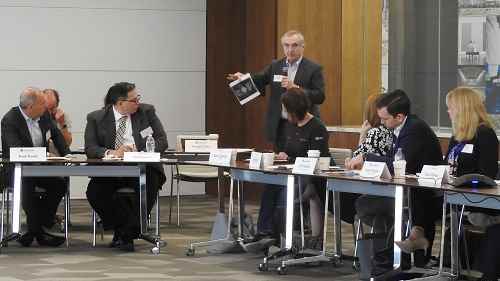Section Navigation
October 8, 2019
October 2019 Executive Committee Meeting

Harvard Business School Professor Joe Fuller addresses UpSkill Houston's Executive Committee
UpSkill Houston Looks at Accelerating its Impact and Scale
The skills challenge of individuals lacking the right skills or credentials they need to compete for good jobs is a clear and present danger to businesses across the United States, but the Houston region is further along in mitigating it than other parts of the country.
That was the message Harvard Business School Professor Joseph Fuller gave the UpSkill Houston Executive Committee at the end of its Oct. 2 meeting where the committee heard final strategy recommendations on how UpSkill Houston can accelerate its impact and scale over the next five years.
Fuller and a delegation of Harvard University professors, administrators, and researchers were special guests at the session as part of an education mission in Houston where they explored how specific examples of functional mechanisms, programs, and partnerships to address the skills gap were built and are managed.
Peter Beard, Greater Houston Partnership senior vice president, Regional Workforce Development, engaged the committee in a discussion of recommendations resulting from work conducted for UpSkill Houston by the Boston Consulting Group on potential approaches for increasing UpSkill Houston’s impact and scale over the next five years.
Beard presented a target goal of advancing a meaningful number of Houstonians into and along careers that require more than a high school diploma but not a bachelor’s degree for entry through an attract-train-place spectrum by focusing on:
- Scaling the ability for students to try out and develop skills for these careers;
- Driving effective career guidance and coaching at inflection points;
- Connecting individuals and employers with skills-based education and hiring; and
- Reframing the message around these careers and sustaining changes in perception and behavior via marketing efforts.
The committee members reviewed and discussed how UpSkill Houston can aspire to big change and make intentional decisions around where to focus. Its future success will require deepening partner participation and building clear accountability, being data- and action-driven, and leveraging existing local networks and establishing a national network to shape broader dialogue.
Beard shared a proposed UpSkill Houston operating model consisting of the Executive Committee, industry sector collaboratives and skills councils, and office staff, along with new elements of a small steering committee, a series of working teams, and a general assembly stakeholder group to engage and align additional business, community and education leaders.
UpSkill Houston retained BCG in the spring of 2019 to help identify ways to scale and accelerate the momentum the initiative has built on several fronts since its 2014 launch. UpSkill Houston also engaged TEConomy Partners to gather and analyze labor market data to inform areas of greatest workforce supply and demand, along with identifying pathways to good jobs in Houston’s economy.
Fuller closed the session by stressing the importance of providing the public with the right information to guide smart decisions around career and educational choices. He suggested infusing soft skill and professional skill development into education and exposing students to the working world earlier would help prepare them to be successful in a career that is a good fit.
Fuller went on to say that Houston has a good start because UpSkill Houston has built a unique collective of key stakeholders that can drive the systemic change. He noted that in many communities the work is being done by siloed groupings of stakeholders. He emphasized the value of having leaders across key systems and organizations in the room together to address the skills challenge effectively.
Related: August 7 Executive Committee Meeting: UpSkill Houston as a Catalyst of Change
Related: Good Companies Don’t Stand Against the Tide of Change
